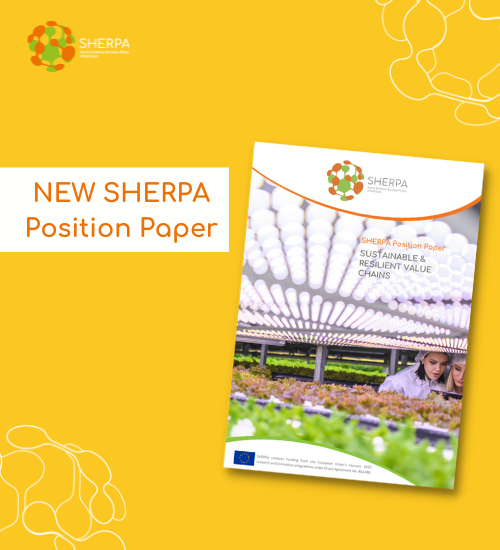SHERPA published a new Position Paper on sustainable and resilient value chains in rural areas. This Position Paper summarizes the views, discussions, and recommendations of 13 of the SHERPA MAPs on this topic.
More prosperous rural areas
Prosperity is one of the four key pillars of the EU’s Long-Term Vision for Rural Areas. Under this pillar, the European Commission committed to support the role of producer organisations and producer groups in rural development, as well as to promoting sustainable bioeconomy in rural areas.
In our Position Paper on “sustainable and resilient value chains” , SHERPA contributes to the reflection on how to support the European Commission in this mission. The Position Paper reviews the work of 13 SHERPA MAPs across Europe on policy interventions and concrete actions implemented to make rural value chains more resilient and sustainable. This latest SHERPA Position Paper focused on strengthening the role of producers in supply chains by :
- Increasing their market power through participation in alternative supply chain models
- Empowering them through education and training
- Building trust between supply chain stakeholders
- Increasing horizontal and vertical coordination
- Promoting communication of sustainable practices.
In addition, the individual MAP contribution is reported in their respective thematic MAP Position Papers and it builds on the Discussion Paper by Bognar & Schwarz (2022).
Key messages
“Sustainable and resilient value chains are necessary for sustainable growth in rural areas, for food security, and for the sustainable use of resources” points out the SHERPA Position Paper. New forms of business models and cooperation can empower producers in rural areas while facilitating social and environmental co-benefits.
The way forward for creating sustainable and resilient value chains is paved with several needs, such as developing clear legal rules to clarify how sustainable value chains should operate, improving the capacities of rural producers to withstand exposures to hazards, or increasing both formal and informal training programmes for rural producers.
Recommendations
Several policies and initiatives are already being put into place and some of them are reported in our Position Paper. Yet, more can be done to pursue this scope. Some of the requests of SHERPA partners entail promoting training opportunities that address the real needs of farmers, providing financial support through more flexible funding criteria, and incentivising collaboration between municipalities, and providing substantial aid for practices that are environmentally-friendly.
In addition, closer cooperation with research organisations it is seen as crucial to foster the adoption of new technologies and social innovation, as well as understanding how principles and processes of sustainable and resilient value chains can be scaled up to global food systems, or improving the understanding of the behaviour, motivations, values and preferences of rural and urban actors.
Learn more
Read more about SHERPA’s position in our Position Paper. How to make rural value chains more resilient and sustainable will be discussed during SHERPA Final Conference (1-2 June 2023), during which SHERPA partners and relevant stakeholders will be called to create SHERPA’s final recommendations!
Published by Carla Lostrangio
